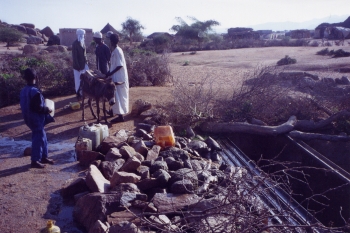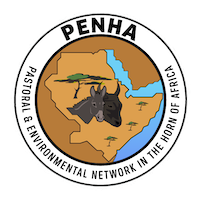PENHA in Eritrea
Although pastoralist communities are well adapted to the climate and fragile natural environment, they are broadly neglected by national and international development efforts. Their actual and potential contribution to food security and national income in Eritrea has until this point not been acknowledged.
Country profile
Population
5 million
Agro-pastoralist population
1/3
Surface area
125,000 km2
Land occupied by pastoralists
55.9%
Human Development Index (HDI)
0.434
Our work in Eritrea

Prosopis as animal feed
Community-based fodder production in Western Eritrea
To meet the main concern of pastoralists in Eritrea – the serious shortage of fodder resources – PENHA in collaboration with the National Union of Eritrean Youth and Students (NUEYS) conducted a training in Tesseney town on alternative fodder production using crop residues and Mesquite (Prosopis juliflora), a widely available and invasive plant species…
Read moreTo meet the main concern of pastoralists in Eritrea – the serious shortage of fodder resources – PENHA in collaboration with the National Union of Eritrean Youth and Students (NUEYS) conducted a training in Tesseney town on alternative fodder production using crop residues and Mesquite (Prosopis juliflora), a widely available and invasive plant species. The programme took place in two cycles – 2007 to 2008 and then from the middle of 2009 to the middle of 2011. The geographical area was the western lowlands of Eritrea – Shambuko, Geluj, Forto-Sawa. It was done in conjunction with the PENHA programme in Kassala State, Sudan – just across the border. The programme was funded by Oxfam Novib from the Netherlands. The two training rounds were attended by a total of 29 pastoralist including 9 female (most of which attended both training rounds) as well as 9 representatives of local organisations and the regional branch of the Ministry of Agriculture.
The training included both theory and practice using both Sudanese and local Eritrean expertise.
An internal evaluation was been carried out on the training in October 2009 and, as well as being made available to the donor (Oxfam Novib), was used in the preparation of the 2nd. cycle of the programme. The next stage in the programme (2nd cycle) included the expansion of the fodder training and take the findings of the evaluation of the 1st. cycle programme into account. The new cycle will focus on local sustainability of the training by conducting the training in the new Pastoralist Centre in Geluj (a PENHA initiative funded by ICCO) and by fully equipping the centre for future training sessions. A key aspect will be that former trainees who take the initiative in setting up village-based trainings will be given the full support of PENHA and NUEYS. In this way, there will be an effective replication of the knowledge and skills which will continue after the end of the programme.

Pastoralist grazing land
Protecting grazing land for pastoralists in Western Eritrea
Resulting from the continuous lobbying efforts exerted by NUEYS, PENHA and the pastoralist forums and committees, in 2009 the local administration in the Goluj subzone granted pastoralists a 450 sq.km grazing reservation area as a measure of goodwill. Signposts were immediately erected by NUEYS…
Read moreResulting from the continuous lobbying efforts exerted by NUEYS, PENHA and the pastoralist forums and committees, in 2009 the local administration in the Goluj subzone granted pastoralists a 450 sq.km grazing reservation area as a measure of goodwill. Signposts were immediately erected by NUEYS (see photograph). This is a great achievement as the shortage of grazing areas and the clear designation of these areas remains a serious concern for pastoralists in the region.
Read less
Empowering pastoralists
Development of the Goluj Pastoralist Centre in Western Lowlands of Eritrea
Following the meeting in 2003, PENHA and NUEYS have pursued the aim of getting a building for pastoralists in Geluz. After several meetings and discussions, the administration in Geluj donated a plot of land and gave permission to build the pastoralist centre…
Read moreFollowing the meeting in 2003, PENHA and NUEYS have pursued the aim of getting a building for pastoralists in Geluz. After several meetings and discussions, the administration in Geluj donated a plot of land and gave permission to build the pastoralist centre. The funds were provided by ICCO from the Netherlands. The compound wall with a gate was built as the first stage and the official hand over from the contractors to PENHA-NUEYS took place in October 2009. It is planned that the centre should foremost be a place of active participation and production with storage facilities, equipment etc.
A committee (with about 40 members) was set up formally by pastoralists and local policymakers. It consists of representatives from all villages within the sub-region of Goluj. The committee will be responsible for the centre, which can be used by all pastoralists living in and visiting the area.
Establishment of pastoralist forums
Three pastoralist forums were set up in Western Lowlands
By the end of the Oxfam NOVIB funded project, over 120 pastoralists of which are 50% of women were participating. They have been trained in educational programmes and leather processing skills enabling them to generate a small income…
Read moreBy the end of the Oxfam NOVIB funded project, over 120 pastoralists of which are 50% of women were participating. They have been trained in educational programmes and leather processing skills enabling them to generate a small income. The project also included an awareness-raising programme to advocate for the needs and concerns of Eritrean pastoralists within Eritrea.
Read lessConstruction of the Geluj pastoralist centre in Gash Barka Western Eritrea
PENHA and NUEYS (the National Union of Eritrean Youth and Students) have worked on a programme to empower pastoralists in the Western Lowlands of Eritrea since 2003.
During a regional pastoralist workshop, pastoralist forum members expressed the view that they urgently needed a centre where they could gather, organise themselves and continue…
Read moreDuring a regional pastoralist workshop, pastoralist forum members expressed the view that they urgently needed a centre where they could gather, organise themselves and continue a variety of activities and training to foster their development. This initiated the development of pastoralist forums in Eritrea.
Read less